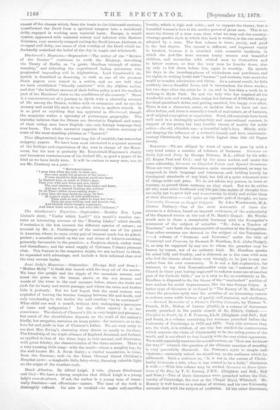Blackwood's Magazine.—Septoraber.--The writer of the "Review of the Session" continues
to exalt the Ministry, describing the Treaty of Berlin as "a great, bloodless triumph of states- manship," and ridiculing the experienced Indian statesmen who prophesied impending evil in Afghanistan. Lord Cranbrook's de- spatch is described as deserving to rank as one of the greatest State papers ever issued to a nation, and we are told that wo have established "friendly relations" with the Afghan nation, and that " the brilliant success of their Indian policy is not the smallest part of the Ministers' claim to the confidence of the country." There is a commencement of a journey in Syria, with a charming account of life among the Drusos, written with an animation and an eye for scenery and social life such as we often miss in modern travels. It is as good as anything that has appeared iu Blackwood, though the magazine makes a spooialty of • picturesque geography. The traveller believes that the Drums are devoted to England, and many of their ruling men know English—the only foreign language they over learn. The whole narrative suggests the curious accuracy of some of the most startling.pictures in " Tenoned."
Tiliw (September) has its usual long list of readable, bat somewhat snippety, papers. We have been most interested in a quaint account of the feelings and experiences of the man in charge of the Monu- ment, but the best is probably Mr. Knatchbull-Hugesson's chatty and humorous reminiscences of his Oxford life, as good a paper of its kind as wo have lately seen. It will be curious to many men, too, to see Mr. Courtney as a poot
" METEMPSYCHOSTR.
"I pray that when my soul, in later ago, Sees once agnin the progress of the yearn—
If true should be that ancient myth one hears
In Eastern lore, or reads in Plato's page,
That ever with new form and new visage The soul migrates, to find fresh hopes and fears, And pay to utmost farthing the arrears
Of all Time'n bitter never-ending wage— I pray that she may drink no more, no leas,
Of Lothe's waves of cold indifference Than snob as may suffice to keep her true ; That she may wisdom seek and passion rue, And cherish dearly-bought experience,
And know what sorrow is, and what life's littleness."


































 Previous page
Previous page